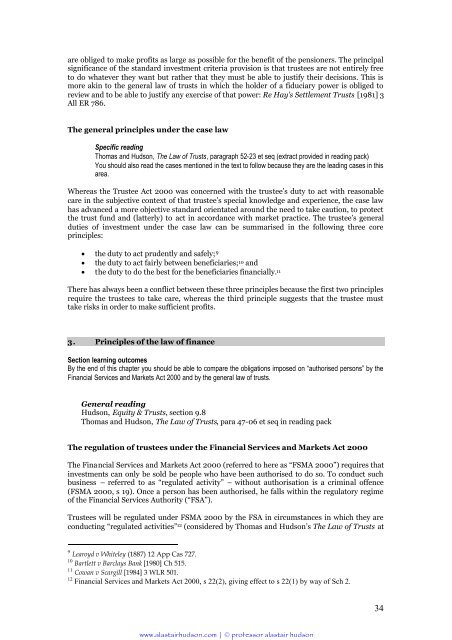Advanced Equity and Trusts Law - alastairhudson.com
Advanced Equity and Trusts Law - alastairhudson.com
Advanced Equity and Trusts Law - alastairhudson.com
Create successful ePaper yourself
Turn your PDF publications into a flip-book with our unique Google optimized e-Paper software.
are obliged to make profits as large as possible for the benefit of the pensioners. The principal<br />
significance of the st<strong>and</strong>ard investment criteria provision is that trustees are not entirely free<br />
to do whatever they want but rather that they must be able to justify their decisions. This is<br />
more akin to the general law of trusts in which the holder of a fiduciary power is obliged to<br />
review <strong>and</strong> to be able to justify any exercise of that power: Re Hay’s Settlement <strong>Trusts</strong> [1981] 3<br />
All ER 786.<br />
The general principles under the case law<br />
Specific reading<br />
Thomas <strong>and</strong> Hudson, The <strong>Law</strong> of <strong>Trusts</strong>, paragraph 52-23 et seq (extract provided in reading pack)<br />
You should also read the cases mentioned in the text to follow because they are the leading cases in this<br />
area.<br />
Whereas the Trustee Act 2000 was concerned with the trustee’s duty to act with reasonable<br />
care in the subjective context of that trustee’s special knowledge <strong>and</strong> experience, the case law<br />
has advanced a more objective st<strong>and</strong>ard orientated around the need to take caution, to protect<br />
the trust fund <strong>and</strong> (latterly) to act in accordance with market practice. The trustee’s general<br />
duties of investment under the case law can be summarised in the following three core<br />
principles:<br />
� the duty to act prudently <strong>and</strong> safely; 9<br />
� the duty to act fairly between beneficiaries; 10 <strong>and</strong><br />
� the duty to do the best for the beneficiaries financially. 11<br />
There has always been a conflict between these three principles because the first two principles<br />
require the trustees to take care, whereas the third principle suggests that the trustee must<br />
take risks in order to make sufficient profits.<br />
3. Principles of the law of finance<br />
Section learning out<strong>com</strong>es<br />
By the end of this chapter you should be able to <strong>com</strong>pare the obligations imposed on “authorised persons” by the<br />
Financial Services <strong>and</strong> Markets Act 2000 <strong>and</strong> by the general law of trusts.<br />
General reading<br />
Hudson, <strong>Equity</strong> & <strong>Trusts</strong>, section 9.8<br />
Thomas <strong>and</strong> Hudson, The <strong>Law</strong> of <strong>Trusts</strong>, para 47-06 et seq in reading pack<br />
The regulation of trustees under the Financial Services <strong>and</strong> Markets Act 2000<br />
The Financial Services <strong>and</strong> Markets Act 2000 (referred to here as “FSMA 2000”) requires that<br />
investments can only be sold be people who have been authorised to do so. To conduct such<br />
business – referred to as “regulated activity” – without authorisation is a criminal offence<br />
(FSMA 2000, s 19). Once a person has been authorised, he falls within the regulatory regime<br />
of the Financial Services Authority (“FSA”).<br />
Trustees will be regulated under FSMA 2000 by the FSA in circumstances in which they are<br />
conducting “regulated activities” 12 (considered by Thomas <strong>and</strong> Hudson’s The <strong>Law</strong> of <strong>Trusts</strong> at<br />
9 Learoyd v Whiteley (1887) 12 App Cas 727.<br />
10 Bartlett v Barclays Bank [1980] Ch 515.<br />
11 Cowan v Scargill [1984] 3 WLR 501.<br />
12 Financial Services <strong>and</strong> Markets Act 2000, s 22(2), giving effect to s 22(1) by way of Sch 2.<br />
www.<strong>alastairhudson</strong>.<strong>com</strong> | © professor alastair hudson<br />
34













